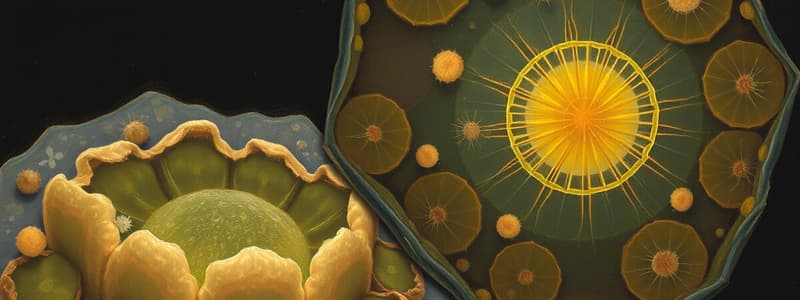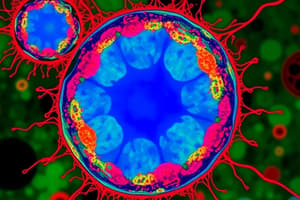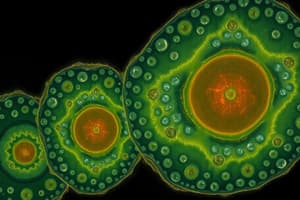Podcast
Questions and Answers
What role does mitochondria play in eukaryotic cells?
What role does mitochondria play in eukaryotic cells?
- Energy generation (correct)
- RNA synthesis
- Photosynthesis
- Protein synthesis
Which statement accurately describes the function of ribosomes?
Which statement accurately describes the function of ribosomes?
- Site of protein synthesis (correct)
- Site of energy conversion
- Storage of genetic material
- Control center of the cell
Which component is responsible for the storage of starch and sugar in plants?
Which component is responsible for the storage of starch and sugar in plants?
- Chloroplast
- Cell wall
- Chromoplast
- Amyloplast (correct)
In terms of genetic information flow, what process involves copying DNA into RNA?
In terms of genetic information flow, what process involves copying DNA into RNA?
What is the main purpose of the nucleolus within a eukaryotic nucleus?
What is the main purpose of the nucleolus within a eukaryotic nucleus?
Which of the following statements about chloroplasts is true?
Which of the following statements about chloroplasts is true?
What function does the nuclear membrane serve in eukaryotic cells?
What function does the nuclear membrane serve in eukaryotic cells?
Which molecule serves as the 'energy currency' of living organisms?
Which molecule serves as the 'energy currency' of living organisms?
What is the primary function of the cell membrane?
What is the primary function of the cell membrane?
Which statement is true regarding prokaryotic cells?
Which statement is true regarding prokaryotic cells?
What is a key difference between rough and smooth endoplasmic reticulum?
What is a key difference between rough and smooth endoplasmic reticulum?
Which of the following is NOT a component of the cell theory?
Which of the following is NOT a component of the cell theory?
Which of these organelles is responsible for digestion within the cell?
Which of these organelles is responsible for digestion within the cell?
What type of cells contain membrane-bound organelles?
What type of cells contain membrane-bound organelles?
Which of the following is an example of a prokaryotic organism?
Which of the following is an example of a prokaryotic organism?
Which organelle is primarily involved in sorting and packaging molecules?
Which organelle is primarily involved in sorting and packaging molecules?
Flashcards are hidden until you start studying
Study Notes
Cell and Cell Theory
- Cells are the basic structural unit of life.
- Cell theory proposes:
- All living organisms are made of cells.
- A cell is the basic unit of life.
- All cells arise from pre-existing cells.
Prokaryotic Cells
- Lacks a nucleus and membrane-bound organelles.
- Unicellular, measuring between 0.1 to 5.0 micrometers in diameter.
- Shapes include rod (bacilli), spiral (spirochete), and spherical (cocci).
- Examples include bacteria from Domain Archaea and Domain Bacteria.
- Term "prokaryote" is derived from Greek words meaning "ancient nuclei."
Eukaryotic Cells
- Contains a nucleus and membrane-bound organelles.
- Can be unicellular or multicellular, measuring 10 to 100 micrometers in diameter.
- Examples include animals, plants, fungi, and protists from Domain Eukarya.
- Term "eukaryote" is derived from Greek words meaning "true nuclei."
Cell Organelles
- Cell Membrane: Semi-permeable membrane regulating entry and exit of substances; consists of a bilipid layer of phospholipids; present in both prokaryotic and eukaryotic cells.
- Cytoplasm: Gel-like fluid filling the cell’s interior where cellular processes occur; found in both prokaryotic and eukaryotic cells.
- Endoplasmic Reticulum (ER): Network of sacs (cisternae); involved in protein and lipid synthesis; only in eukaryotic cells.
- Rough ER: Contains ribosomes for protein synthesis.
- Smooth ER: Lacks ribosomes, involved in lipid synthesis.
- Golgi Apparatus: Sorts, modifies, packages, and transports molecules; found only in eukaryotic cells.
- Lysosome: Acts as the cell's digestive system using hydrolytic enzymes; present only in eukaryotic cells.
- Mitochondria: Known as the "powerhouse" of the cell, generates energy in the form of ATP (Adenosine Triphosphate), the "energy currency" of living organisms.
- Nucleus: Control center of eukaryotic cells.
- Nucleolus: Site of RNA synthesis.
- Nucleoplasm: Fluid within the nucleus.
- Nuclear Membrane: Surrounds the nucleus, separating it from the cytoplasm.
- Nucleoid: Control center of prokaryotic cells.
- Ribosomes: Site of protein synthesis.
- Peroxisome: Oxidizes and detoxifies harmful substances.
Organelles Unique to Plants
- Cell Wall: Rigid outer layer providing strength and protection; found in prokaryotes and eukaryotes, but not present in plant cells.
- Plastids:
- Chloroplast: Responsible for photosynthesis, contains chlorophyll (green pigment).
- Chromoplast: Assists in propagation and reproduction.
- Amyloplast: Stores starch and sugars.
Central Dogma of Molecular Biology
- Describes the flow of genetic information from DNA to RNA to protein, proposed by Francis Crick.
- Replication: Process of duplicating DNA.
- Transcription: Process of copying DNA information into RNA.
- mRNA (Messenger RNA): Product of transcription carrying coding information (codons); includes start codon (AUG) and stop codons (UAA, UGA, UAG).
- tRNA (Transport RNA): Carries anticodons correlating with mRNA for amino acid delivery.
- rRNA (Ribosomal RNA): Does not contain codons or anticodons but is essential in ribosomes for protein synthesis.
Studying That Suits You
Use AI to generate personalized quizzes and flashcards to suit your learning preferences.




